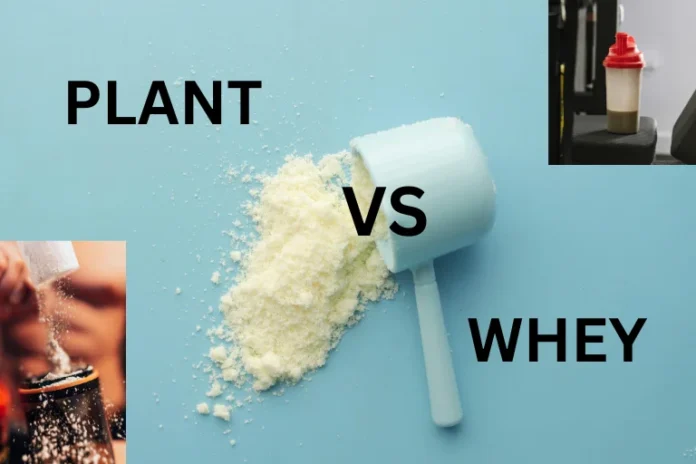Whey Protein vs. Plant Protein: Nutritional Value and Health Benefits
Protein is an essential macronutrient that plays a crucial role in muscle growth, repair, and overall body function. Among the many protein sources available, whey protein and plant-based protein powders are two of the most popular choices, especially for those looking to supplement their diets for fitness or health reasons. But how do these two types of protein compare in terms of nutritional value, digestibility, and overall health benefits? This article explores the differences between whey and plant protein to help you determine which is best for your needs.
Nutritional Value of Whey Protein
Whey protein is derived from milk during the cheese-making process. It is considered a complete protein, meaning it contains all nine essential amino acids that the human body cannot produce on its own. Whey protein is particularly rich in branched-chain amino acids (BCAAs), including leucine, which plays a significant role in muscle protein synthesis and recovery.
Key Nutrients in Whey Protein:
High-Quality Protein: Whey has a high biological value (BV), indicating that the body can efficiently use it for growth and repair.
Rich in BCAAs: These amino acids help with muscle recovery and reduce muscle breakdown.
Fast Absorption: Whey protein is rapidly digested and absorbed, making it ideal for post-workout recovery.
Additional Nutrients: Whey protein naturally contains immunoglobulins and lactoferrin, which support immune function.
However, whey protein may not be suitable for everyone. It contains lactose, which can be difficult for those with lactose intolerance or dairy allergies to digest. Additionally, some individuals experience bloating or digestive discomfort from whey protein.
Nutritional Value of Plant Protein
Plant protein is derived from various plant sources such as peas, soy, rice, hemp, and quinoa. Unlike whey protein, some plant proteins may be incomplete, meaning they do not contain all nine essential amino acids. However, by combining different plant proteins, manufacturers create blends that offer a complete amino acid profile.
Key Nutrients in Plant Protein:
Rich in Fiber: Many plant-based protein powders contain fiber, which aids digestion and supports gut health.
Lower in BCAAs but Balanced Amino Acids: Although individual plant proteins may lack certain amino acids, blends often ensure a complete profile.
Antioxidants and Phytonutrients: Plant proteins contain beneficial compounds that support overall health and reduce inflammation.
Free from Dairy and Lactose: Plant proteins are ideal for those with dairy intolerances or vegan lifestyles.
Plant-based proteins may be slightly lower in leucine than whey protein, which is a crucial amino acid for muscle growth. However, consuming a variety of plant protein sources can help compensate for this.
Which Protein is Best for Health?
Muscle Growth and Recovery
Whey protein is superior when it comes to muscle protein synthesis due to its high leucine content and fast digestion. Studies show that whey protein is more effective for building and repairing muscle compared to plant-based proteins. However, plant-based protein can still be effective, especially if consumed in sufficient amounts and combined with other plant proteins to ensure a complete amino acid profile.
Digestibility and Gut Health
Plant protein is generally easier on digestion for those with lactose intolerance or dairy sensitivity. It also contains fiber, which supports gut health by promoting healthy digestion and beneficial gut bacteria. On the other hand, whey protein may cause bloating or discomfort in some individuals due to lactose content.
Weight Management
Both whey and plant protein can aid in weight management. Protein helps increase satiety and reduce hunger, making it easier to maintain a healthy weight. However, plant-based proteins may be slightly more beneficial due to their fiber content, which enhances satiety and promotes a balanced gut microbiome.
Heart Health and Cholesterol Levels
Plant proteins generally have an edge over whey protein in terms of heart health. Studies suggest that plant-based diets, which include plant proteins, may help lower cholesterol and reduce the risk of cardiovascular disease. Whey protein, while not necessarily harmful, does not provide the same heart-healthy benefits as plant-based sources.
Sustainability and Ethical Considerations
From an environmental perspective, plant protein is the more sustainable option. The production of plant-based protein requires fewer natural resources, such as water and land, and generates lower greenhouse gas emissions compared to dairy-based protein sources like whey.
Conclusion: Which Protein Should You Choose?
The choice between whey protein and plant protein depends on individual goals, dietary preferences, and health conditions. If your main goal is to build muscle and recover quickly after workouts, whey protein might be the better option due to its high leucine content and fast absorption. However, if you have dairy sensitivities, prioritize gut health, or follow a plant-based diet, plant protein is an excellent alternative that offers additional fiber and phytonutrients.
For those seeking a well-balanced protein source, a combination of plant-based proteins (such as pea and rice protein) can provide a complete amino acid profile similar to whey. Ultimately, the best protein is the one that fits your lifestyle, dietary needs, and long-term health goals.

